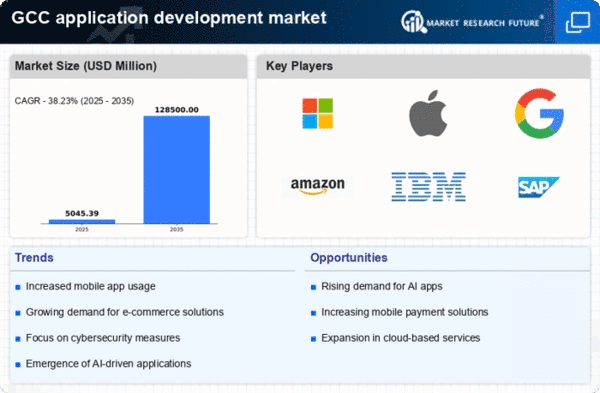Adoption of Cloud Technologies
The adoption of cloud technologies is reshaping the application development market in the GCC. As organizations increasingly migrate to cloud-based solutions, the demand for applications that leverage these technologies is on the rise. In 2025, it is estimated that cloud services will account for over 30% of IT spending in the region. This shift enables developers to create scalable and flexible applications that can be easily updated and maintained. Moreover, cloud technologies facilitate collaboration among development teams, enhancing productivity and innovation. As businesses recognize the benefits of cloud integration, the application development market is likely to witness a surge in projects aimed at harnessing the power of the cloud.
Government Initiatives and Support
Government initiatives in the GCC region play a crucial role in shaping the application development market. Various national strategies aim to foster innovation and digital transformation, thereby creating a conducive environment for developers. For instance, the UAE's Vision 2021 emphasizes the importance of technology in enhancing economic diversification. Such initiatives often include funding programs, tax incentives, and support for startups, which collectively stimulate growth in the application development market. In 2025, it is anticipated that government-backed projects will contribute to a 15% increase in the number of new applications launched annually. This support not only encourages local talent but also attracts international developers, further enriching the market landscape.
Surge in Mobile Application Demand
The application development market experiences a notable surge in mobile application demand across the GCC region. With a population increasingly reliant on smartphones, the need for innovative mobile solutions is paramount. In 2025, mobile applications are projected to account for approximately 70% of all software downloads in the region. This trend is driven by the growing adoption of mobile banking, e-commerce, and social networking applications. As businesses recognize the potential of mobile platforms, investments in mobile application development are likely to escalate. This shift not only enhances user engagement but also opens new revenue streams for developers. Consequently, the application development market is poised for substantial growth as companies strive to meet the evolving preferences of tech-savvy consumers.
Growing Emphasis on User Experience
The application development market is witnessing a growing emphasis on user experience (UX) design, which is becoming a critical differentiator for applications in the GCC. As competition intensifies, developers are increasingly prioritizing intuitive interfaces and seamless interactions to attract and retain users. In 2025, it is projected that applications with superior UX will see a 20% higher user retention rate compared to those with less focus on design. This trend is driven by consumer expectations for high-quality digital experiences across various platforms. Consequently, developers are investing in research and testing to refine UX, thereby enhancing the overall appeal of applications. The application development market is thus evolving to meet the demands of discerning users.
Rising E-commerce and Digital Services
The application development market is significantly influenced by the rising e-commerce and digital services sector in the GCC. As consumers increasingly turn to online platforms for shopping and services, businesses are compelled to develop robust applications to remain competitive. In 2025, e-commerce sales in the region are expected to reach $30 billion, driving demand for applications that facilitate seamless transactions and enhance user experiences. This trend is further supported by the growing penetration of high-speed internet and mobile connectivity. Consequently, developers are focusing on creating applications that integrate payment gateways, customer support, and personalized shopping experiences. The application development market is thus positioned to thrive as businesses adapt to the digital landscape.
















